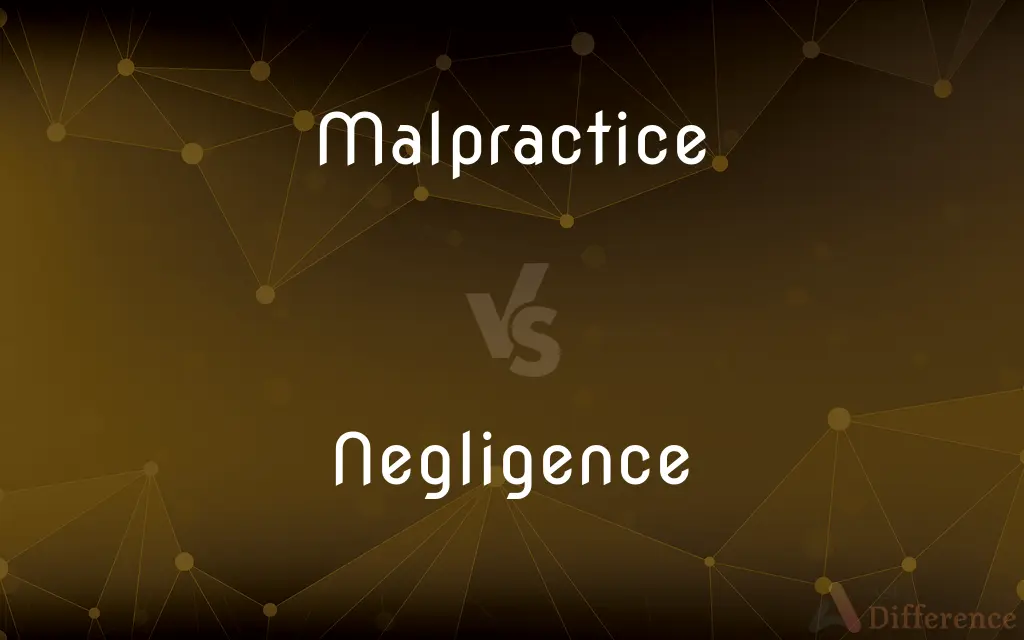Malpractice vs. Negligence — What's the Difference?
By Tayyaba Rehman — Updated on September 23, 2023
Malpractice refers to professional misconduct or lack of skill, while Negligence is a broader term denoting a failure to exercise proper care in any situation.

Difference Between Malpractice and Negligence
Table of Contents
ADVERTISEMENT
Key Differences
Malpractice and Negligence are both legal concepts that address wrongdoing, but they are applied in different contexts. Malpractice typically pertains to professionals, such as doctors or lawyers, and indicates that there was a breach of the standard of care or professional duty. In contrast, Negligence applies more broadly to any situation where a duty of care was breached, not necessarily within a professional setting.
In essence, all Malpractice can be considered Negligence, but not all Negligence amounts to Malpractice. For instance, if a doctor makes an error during surgery due to a lapse in judgment or skill, it could be considered medical Malpractice. However, if someone forgets to water their plants, leading them to wither, it's Negligence, but not Malpractice, as it's not a professional error.
The implications of Malpractice and Negligence can vary. Victims of Malpractice might be eligible for compensation due to the harm they endured as a result of a professional's error. Similarly, those who suffer because of another's Negligence may seek damages. However, proving Malpractice often requires demonstrating that the professional deviated from the accepted standard of care in their field, while proving Negligence might not necessarily involve such specific standards.
Lastly, both Malpractice and Negligence emphasize the importance of responsibility. Professionals are trusted by the public to perform their duties with competence and care. Likewise, every individual has a responsibility not to harm others through careless or reckless actions. Thus, both concepts underscore the significance of accountability in different areas of life.
Comparison Chart
Definition
Professional misconduct or lack of skill.
Failure to exercise proper care in any situation.
ADVERTISEMENT
Scope
Specific to professionals.
Broad and can apply to anyone.
Legal Implications
Often requires proving deviation from a professional standard.
Generally involves proving a breach of a duty of care.
Examples
Medical, legal malpractice.
Forgetting to turn off the stove, causing a fire.
Relation
A subset of Negligence.
A broader concept that encompasses Malpractice.
Compare with Definitions
Malpractice
An act deviating from accepted professional standards.
The accountant's fraudulent activities were considered Malpractice.
Negligence
Failure to exercise due care.
Leaving the gate open, leading to the dog's escape, was Negligence.
Malpractice
Professional wrongdoing or incompetence.
The surgeon faced a lawsuit due to his Malpractice.
Negligence
A breach of a duty of care.
Not maintaining the playground equipment showed Negligence.
Malpractice
Errors made by professionals in their field.
The architect's flawed design was deemed Malpractice.
Negligence
Carelessness resulting in harm to another.
His Negligence in driving led to the car accident.
Malpractice
Misconduct or lack of skill by a professional.
The teacher's inappropriate behavior in class was labeled as Malpractice.
Negligence
Omitting proper attention or care.
Negligence in maintaining the building led to its collapse.
Malpractice
In the law of torts, malpractice, also known as professional negligence, is an "instance of negligence or incompetence on the part of a professional".Professionals who may become the subject of malpractice actions include: medical professionals: a medical malpractice claim may be brought against a doctor or other healthcare provider who fails to exercise the degree of care and skill that a similarly situated professional of the same medical specialty would provide under the circumstances. lawyers: a legal malpractice claim may be brought against a lawyer who fails to render services with the level of skill, care and diligence that a reasonable lawyer would apply under similar circumstances.
Negligence
Overlooking or disregarding safety.
Ignoring the warning signs was sheer Negligence.
Malpractice
Improper, illegal, or negligent professional behaviour
Investigations into malpractices and abuses of power
Victims of medical malpractice
Negligence
Negligence (Lat. negligentia) is a failure to exercise appropriate and/or ethical ruled care expected to be exercised amongst specified circumstances.
Malpractice
Performance, as by a physician or lawyer, that falls below the professional minimum standard of care or service for a patient or client, especially when legally actionable because an injury or loss has been suffered by the patient or client.
Negligence
The state or quality of being negligent.
Malpractice
An instance of such performance.
Negligence
A negligent act or a failure to act.
Malpractice
The improper treatment of a patient by a physician that results in injury or loss.
Negligence
Failure to use the degree of care appropriate to the circumstances, resulting in an unintended injury to another.
Malpractice
Improper or unethical conduct by a professional or official person.
Negligence
An act or omission showing such lack of care.
Malpractice
Evil practice; illegal or immoral conduct; practice contrary to established rules; specifically, the treatment of a case by a surgeon or physician in a manner which is contrary to accepted rules and productive of unfavorable results.
Negligence
The state of being negligent.
Negligence while driving
Malpractice
Professional wrongdoing that results in injury or damage;
The widow sued his surgeon for malpractice
Negligence
The tort whereby a duty of reasonable care was breached, causing damage: any conduct short of intentional or reckless action that falls below the legal standard for preventing unreasonable injury.
Malpractice
A wrongful act that the actor had no right to do; improper professional conduct;
He charged them with electoral malpractices
Negligence
The breach of a duty of care: the failure to exercise a standard of care that a reasonable person would have in a similar situation.
Malpractice
A breach in the standard of professional care.
The attorney's failure to file the paperwork was clear Malpractice.
Negligence
The quality or state of being negligent; lack of due diligence or care; omission of duty; habitual neglect; heedlessness.
Negligence
An act or instance of negligence or carelessness.
Remarking his beauties, . . . I must also point out his negligences and defects.
Negligence
The omission of the care usual under the circumstances, being convertible with the Roman culpa. A specialist is bound to higher skill and diligence in his specialty than one who is not a specialist, and liability for negligence varies acordingly.
Negligence
Failure to act with the prudence that a reasonable person would exercise under the same circumstances
Negligence
The trait of neglecting responsibilities and lacking concern
Common Curiosities
Can anyone commit Negligence?
Yes, Negligence can be committed by anyone failing to exercise due care.
Is Malpractice a form of Negligence?
Yes, Malpractice is a specific type of professional Negligence.
Is Malpractice exclusive to the medical field?
No, Malpractice can apply to various professionals, including lawyers and accountants.
Do all professionals have the same Malpractice standards?
No, Malpractice standards vary depending on the profession and its accepted practices.
How is Malpractice different from an honest mistake?
Malpractice typically involves a deviation from professional standards, while an honest mistake may not.
Does Malpractice always result in legal action?
Not always, but victims of Malpractice can seek legal remedies if harmed.
What's a common example of Negligence?
Leaving a wet floor without a warning sign can be considered Negligence.
Is Negligence always intentional?
No, Negligence is often unintentional, arising from carelessness.
Are accidents always a result of Negligence?
No, accidents can occur without Negligence, but many accidents result from careless behavior.
How does one prove Negligence?
One must demonstrate a duty of care, a breach of that duty, and resultant harm.
Can Malpractice lead to losing a professional license?
Yes, severe or repeated Malpractice can result in professional sanctions or license revocation.
Is there a statute of limitations on Negligence claims?
Yes, the time limit varies by jurisdiction but there's typically a window to file Negligence claims.
Share Your Discovery

Previous Comparison
Education vs. Schooling
Next Comparison
Tallboy vs. WardrobeAuthor Spotlight
Written by
Tayyaba RehmanTayyaba Rehman is a distinguished writer, currently serving as a primary contributor to askdifference.com. As a researcher in semantics and etymology, Tayyaba's passion for the complexity of languages and their distinctions has found a perfect home on the platform. Tayyaba delves into the intricacies of language, distinguishing between commonly confused words and phrases, thereby providing clarity for readers worldwide.















































